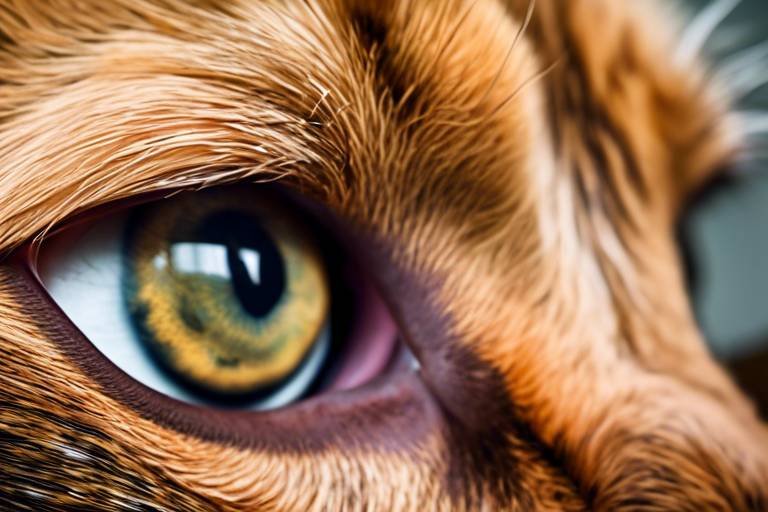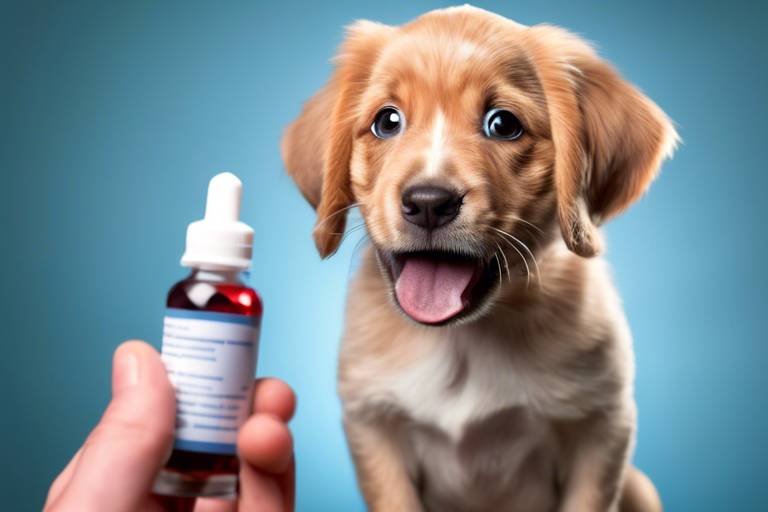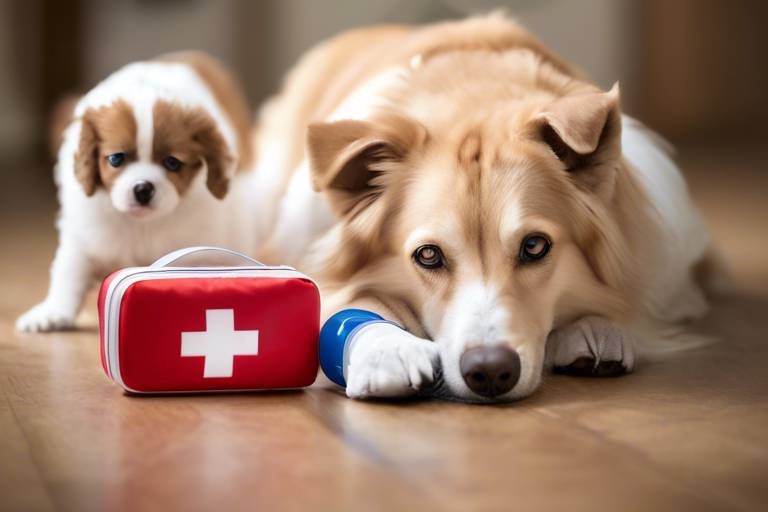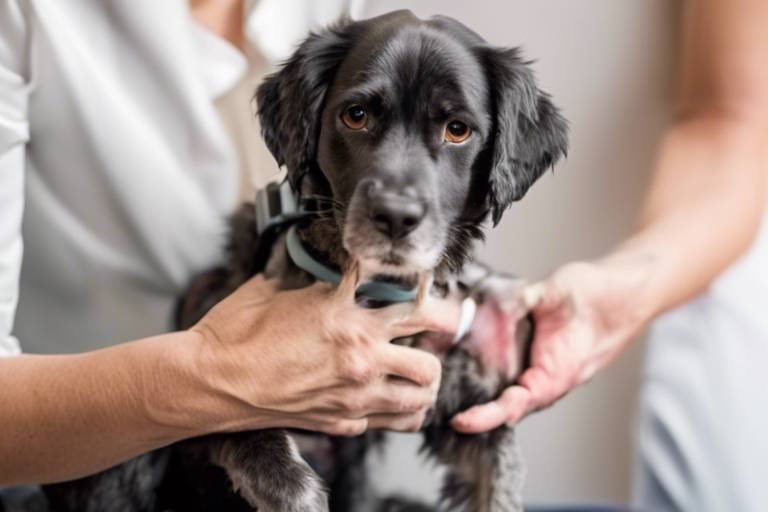What to Do If Your Pet Experiences Sudden Lethargy
As a pet owner, it can be incredibly alarming to notice your furry friend suddenly becoming lethargic. One moment, they're bouncing around the house, and the next, they're curled up in a corner, barely moving. It's essential to understand that lethargy can be a significant indicator of underlying health issues, and recognizing it early can make all the difference in your pet's recovery. In this article, we will explore the potential causes of sudden lethargy in pets and provide guidance on how to respond effectively to ensure your furry friend's health and well-being.
Understanding the signs of lethargy is crucial for pet owners. Lethargy in pets can manifest in various ways, and it's important to differentiate it from normal tiredness. If your pet is less active than usual, seems disinterested in their favorite activities, or is reluctant to engage with you or other pets, these could be signs of lethargy. Additionally, if your pet is sleeping more than normal or has a noticeable decrease in appetite, it might be time to pay closer attention. Remember, every pet is unique, and what is normal for one may not be for another. Trust your instincts; if something feels off, it’s worth investigating further.
Various factors can lead to sudden lethargy in pets. It can be a symptom of an underlying illness, an injury, or even changes in their environment. Some common causes include:
- Illness: Many health issues can lead to lethargy, ranging from minor infections to serious diseases.
- Injury: If your pet has sustained an injury, they may exhibit lethargy as a response to pain or discomfort.
- Environmental Changes: Changes in temperature, humidity, or stress factors can also affect your pet’s energy levels.
Lethargy can often be a symptom of underlying health issues. For instance, infections can significantly impact your pet's energy levels. Diseases such as parvovirus or distemper can lead to severe lethargy, and it's crucial to be vigilant for other accompanying signs like vomiting, diarrhea, or fever. If you suspect your pet might have an illness, seeking veterinary care promptly can be life-saving.
Infections can weigh heavily on your pet's energy. For example, parvovirus is notorious for causing lethargy in dogs, especially puppies. Symptoms may include severe vomiting and diarrhea, leading to dehydration and further lethargy. Distemper, another serious viral infection, can also present with lethargy among other symptoms like coughing and nasal discharge. Being aware of these diseases and their signs can help you act quickly.
Chronic health conditions such as diabetes or heart disease can also cause lethargy. Pets with diabetes may show signs of lethargy due to fluctuating blood sugar levels, while heart disease can lead to fatigue as the heart struggles to pump blood effectively. If your pet has been diagnosed with a chronic condition, regular monitoring and communication with your veterinarian are essential to manage their health effectively.
Sometimes, lethargy can stem from environmental changes. Factors like temperature and humidity can affect your pet's comfort and energy levels. For instance, during hot summer months, pets may become lethargic due to heat exhaustion. Similarly, stress from changes in routine, new pets, or loud noises can lead to a noticeable drop in energy. Being mindful of these factors can help you create a more comfortable environment for your pet.
Knowing when to contact a veterinarian is vital. If your pet's lethargy is accompanied by additional symptoms such as persistent vomiting, diarrhea, difficulty breathing, or if they are unresponsive to stimuli, these are critical signs that indicate your pet's lethargy may require professional medical attention. It’s always better to err on the side of caution. Your veterinarian can perform necessary tests to diagnose the issue and recommend appropriate treatment.
Certain symptoms accompanying lethargy can signal emergencies. If your pet shows signs of severe distress, such as seizures, inability to stand, or extreme lethargy that comes on suddenly, do not hesitate to seek immediate veterinary intervention. These situations can be life-threatening, and prompt action is essential to ensure your pet's safety.
Regular veterinary visits are essential for maintaining your pet's health. Routine check-ups can help catch potential issues before they escalate into serious problems that cause lethargy. During these visits, your veterinarian can perform wellness exams, vaccinations, and blood tests to monitor your pet's overall health. Keeping a schedule for these check-ups can significantly benefit your pet in the long run.
If your pet is lethargic but not in immediate danger, there are ways to provide care at home. Creating a comfortable environment is key. Ensure they have a quiet, cozy space to rest. You can also monitor their recovery by keeping an eye on their eating and drinking habits. If your pet is reluctant to eat or drink, try offering small amounts of their favorite food or fresh water frequently.
Ensuring your pet stays hydrated and nourished is crucial during recovery. Offer fresh water at all times and consider providing wet food or broth to encourage them to eat. Proper hydration and nutrition can aid in their recovery and help restore their energy levels.
Creating a restful environment can help your pet recuperate. Make sure their resting area is quiet and free from disturbances. Soft bedding and familiar toys can provide comfort and encourage rest during their recovery process. Remember, the more relaxed your pet feels, the better their chances of bouncing back to their usual energetic self.
Q: What should I do if my pet is lethargic but not showing other symptoms?
A: Monitor your pet closely and ensure they are comfortable. If lethargy persists for more than 24 hours or worsens, consult your veterinarian.
Q: Can environmental changes cause lethargy in pets?
A: Yes, changes in temperature, humidity, or stress can lead to lethargy. Ensure your pet is in a comfortable environment to help them feel better.
Q: How can I tell if my pet's lethargy is serious?
A: If your pet shows additional concerning symptoms such as vomiting, diarrhea, or difficulty breathing, seek veterinary help immediately. It's always better to be safe.

Recognizing Lethargy in Pets
This article explores the potential causes of sudden lethargy in pets and provides guidance on how to respond effectively to ensure your furry friend's health and well-being.
Understanding the signs of lethargy is crucial for pet owners. Imagine your furry friend, usually bursting with energy, suddenly turning into a couch potato—this can be alarming! Lethargy isn't just about being sleepy; it's a significant change in your pet's usual behavior. So, how can you tell if your pet is lethargic? Look for signs that indicate a shift from their normal activity levels. For instance, if your dog, who typically races to the door when you come home, is now lounging on the floor without a care, it’s time to take notice.
Common behaviors that may indicate lethargy include:
- Reduced activity levels: If your pet is no longer interested in playtime or walks, this could be a red flag.
- Changes in eating or drinking habits: A sudden decrease in appetite or thirst can signal underlying issues.
- Difficulty in movement: If your pet seems stiff or struggles to get up, it might be more than just laziness.
- Unusual vocalization: Changes in how your pet communicates, such as whining or growling, can indicate discomfort.
It's important to differentiate lethargy from normal tiredness. Just like us, pets can have off days where they want to relax a bit more. However, if this tiredness persists for more than a day or is accompanied by other symptoms, it’s time to take action. Think of it like this: if your dog usually loves a game of fetch but suddenly shows no interest, it could be a sign that something is wrong. Trust your instincts—if you feel something is off, it probably is!
Additionally, consider the context of their lethargy. For example, if your pet has been exposed to a stressful situation, like a move or a new pet in the house, they may show signs of lethargy as a response. However, if there's no clear reason for their behavior change, it could indicate a deeper issue that requires attention. Keeping a close eye on your pet's habits and behaviors is essential in recognizing these changes early on.
Various factors can lead to sudden lethargy in pets. Here, we will explore some of the most frequent causes, including illness, injury, and environmental changes that may affect your pet's energy levels.
Lethargy can often be a symptom of underlying health issues. This subsection will delve into specific illnesses that may cause your pet to become unusually tired and the importance of seeking veterinary care.
Infections can significantly impact your pet's energy. We will discuss how diseases like parvovirus or distemper can lead to lethargy and the signs to watch for in these cases.
Chronic health conditions such as diabetes or heart disease can also cause lethargy. This part will explain how these diseases manifest and what pet owners should be aware of.
Sometimes, lethargy can stem from environmental changes. This section will cover how factors like temperature, humidity, and stress can influence your pet's energy levels and behavior.
Knowing when to contact a veterinarian is vital. This section will outline the critical signs that indicate your pet's lethargy may require professional medical attention for further evaluation.
Certain symptoms accompanying lethargy can signal emergencies. This subsection will highlight specific signs that warrant immediate veterinary intervention to ensure your pet's safety.
Regular veterinary visits are essential for maintaining your pet's health. Here, we will discuss the importance of routine check-ups in preventing conditions that could lead to lethargy.
If your pet is lethargic but not in immediate danger, there are ways to provide care at home. This section will offer tips on creating a comfortable environment and monitoring your pet's recovery.
Ensuring your pet stays hydrated and nourished is crucial during recovery. This part will discuss the importance of proper hydration and nutrition for a lethargic pet's health.
Creating a restful environment can help your pet recuperate. We will provide suggestions on how to make your pet comfortable and encourage rest during their recovery process.
Here are some common questions pet owners have regarding lethargy:
- What should I do if my pet is lethargic? Monitor their behavior closely, and if it persists, consult your veterinarian.
- Can changes in weather cause lethargy? Yes, extreme temperatures and humidity can affect your pet's energy levels.
- How can I tell if my pet is sick? Look for changes in appetite, behavior, and energy levels.

Common Causes of Sudden Lethargy
Sudden lethargy in pets can be alarming for any pet owner. It's essential to understand that various factors can contribute to your furry friend's sudden drop in energy levels. While some causes may be benign, others could indicate serious health issues that require immediate attention. Let's dive into the most common culprits behind this concerning behavior.
One of the primary reasons for sudden lethargy is illness. Just like humans, pets can fall ill and exhibit signs of fatigue. This can range from mild infections to severe diseases. For instance, a pet suffering from a viral infection may display a lack of energy, decreased appetite, and unusual behavior. Moreover, conditions such as diabetes or heart disease can lead to chronic lethargy, making it crucial to monitor your pet's overall health.
Another significant factor is injury. If your pet has had an accident or sustained an injury, they may become lethargic as a way to cope with pain. It's their body's natural response to limit movement and conserve energy while healing. If you suspect your pet has been injured, look for signs such as limping, whining, or excessive grooming of a particular area.
Environmental changes can also play a role in your pet's energy levels. Factors like temperature, humidity, and even stress can affect how lively your pet feels. For example, extreme heat can lead to heat exhaustion, causing lethargy. Similarly, a change in your household routine or the introduction of new pets can stress your furry friend, leading to a noticeable drop in their activity levels.
To further illustrate these causes, consider the table below:
| Cause | Description |
|---|---|
| Illness | Various health issues, from mild infections to chronic diseases. |
| Injury | Physical trauma or pain can lead to decreased energy and movement. |
| Environmental Changes | Temperature, humidity, and stress can affect your pet's behavior. |
Understanding these causes can help you better assess your pet's condition. If you notice your pet exhibiting lethargy, take a moment to observe any other symptoms they might be displaying. Are they eating normally? Are they drinking water? Are they showing any signs of pain or discomfort? Gathering this information can be invaluable when discussing your pet's health with a veterinarian.
In conclusion, sudden lethargy in pets can stem from a variety of sources. Being aware of these potential causes will empower you to take the necessary steps to ensure your furry friend's well-being. Remember, while some reasons may be harmless, others can be serious, and it's always better to err on the side of caution when it comes to your pet's health.
- What should I do if my pet is lethargic? - Monitor their behavior and look for other symptoms. If the lethargy persists, consult your veterinarian.
- Can environmental changes cause lethargy? - Yes, factors such as temperature, humidity, and stress can significantly impact your pet's energy levels.
- How can I tell if my pet is sick? - Look for changes in appetite, drinking habits, and activity levels. Unusual behaviors may also indicate illness.
Illness-Related Lethargy
Lethargy in pets can often be a red flag, signaling that something is amiss. It’s not just a case of your furry friend wanting to take a snooze; it could be a symptom of an underlying health issue that needs immediate attention. Think of lethargy as your pet's way of waving a little flag, saying, "Hey, something's not right!" Understanding the specific illnesses that can cause lethargy is crucial for any pet owner who wants to ensure their beloved companion stays healthy and happy.
There are several illnesses that can lead to lethargy, and recognizing these can make all the difference. For instance, conditions such as infections, metabolic disorders, and chronic diseases can sap your pet's energy levels. Here are a few notable examples:
- Infections: Common infections like kennel cough or urinary tract infections can leave your pet feeling drained.
- Metabolic Disorders: Conditions such as diabetes can cause lethargy due to fluctuating blood sugar levels.
- Chronic Diseases: Heart disease or cancer can lead to a gradual decline in energy, resulting in noticeable lethargy over time.
It’s essential to pay attention to any additional symptoms that accompany your pet's lethargy. For example, if your dog is not only lethargic but also has a loss of appetite, vomiting, or diarrhea, this could indicate a more serious issue that requires prompt veterinary care. The sooner you can identify and address these symptoms, the better the chances are for a positive outcome.
When you notice lethargy, consider keeping a log of your pet’s behavior. Note down any changes in their eating habits, drinking patterns, and bathroom habits. This information can be invaluable to your veterinarian, helping them pinpoint the issue more quickly. Remember, your pet relies on you to recognize when something's off, so don’t hesitate to reach out for professional help if you’re concerned.
In summary, illness-related lethargy is a serious concern that should never be ignored. By being vigilant and proactive, you can help ensure your pet receives the care they need when they need it most. After all, our pets can’t speak up for themselves, so it’s up to us to be their voice!
- What should I do if my pet is lethargic? - Observe their behavior, note any additional symptoms, and consult your veterinarian if you have concerns.
- Can lethargy be a sign of something serious? - Yes, lethargy can indicate underlying health issues that require medical attention.
- How can I help my lethargic pet at home? - Ensure they have a comfortable resting place, stay hydrated, and monitor their food intake.
Infections and Diseases
When it comes to our furry companions, their health is of utmost importance, and one of the red flags that should raise concern is lethargy. This symptom can often be an indication of underlying health issues, particularly infections and diseases that can sap your pet's energy and vitality. For instance, conditions such as parvovirus and distemper are notorious for causing severe lethargy in pets, especially in puppies and unvaccinated dogs. If your pet suddenly loses interest in their usual activities, it might be time to investigate further.
Infections, whether viral, bacterial, or parasitic, can be detrimental to your pet's overall well-being. For example, canine parvovirus is a highly contagious virus that primarily affects puppies and can lead to symptoms such as vomiting, diarrhea, and, notably, lethargy. Similarly, feline distemper can have a profound effect on cats, leading to a significant drop in their energy levels. It's essential to be vigilant and observe any additional symptoms that may arise, as these can provide crucial clues about the underlying issue.
Moreover, chronic conditions such as heartworm disease can also manifest as lethargy. This parasitic infection is transmitted through mosquito bites and can lead to severe health complications if left untreated. Pets suffering from heartworm may show signs of fatigue, coughing, and a reduced interest in play. Thus, if you notice your pet exhibiting unusual tiredness, it's vital to consider whether they might have been exposed to potential infections or diseases.
In addition to these specific conditions, there are other diseases that can cause lethargy in pets. For instance, Lyme disease, transmitted by ticks, can lead to fatigue, joint pain, and even fever. It's essential to keep an eye out for other symptoms such as loss of appetite or changes in behavior, as these can indicate a more serious health issue. If you're unsure about your pet's health, consulting with a veterinarian is always the best course of action.
To summarize, being aware of the signs of infections and diseases in your pet is crucial. If you notice sudden lethargy accompanied by other symptoms, it’s time to take action. Here’s a quick reference table to help you understand some common infections and their associated symptoms:
| Disease | Common Symptoms | Recommended Action |
|---|---|---|
| Parvovirus | Vomiting, diarrhea, lethargy | Immediate veterinary care |
| Distemper | Coughing, fever, lethargy | Immediate veterinary care |
| Heartworm | Fatigue, coughing, weight loss | Veterinary testing and treatment |
| Lyme Disease | Fatigue, joint pain, fever | Veterinary examination and treatment |
As a responsible pet owner, it’s your duty to monitor your pet’s health closely. If lethargy persists or worsens, don’t hesitate to reach out to your veterinarian. Remember, early detection can lead to better outcomes!
- What should I do if my pet is lethargic?
If your pet shows signs of lethargy, observe for other symptoms. If it persists, consult your veterinarian. - Can environmental factors cause lethargy?
Yes, changes in temperature, humidity, or stress can affect your pet's energy levels. - How can I prevent infections in my pet?
Regular vaccinations, parasite control, and routine veterinary check-ups are essential for prevention.
Chronic Conditions
Chronic health conditions can be a significant factor when it comes to your pet's sudden lethargy. Just like humans, pets can suffer from long-term illnesses that may not always be immediately visible but can drastically affect their energy levels and overall quality of life. Conditions such as diabetes, heart disease, and kidney issues can lead to a gradual decline in your pet's health, often manifesting as lethargy. For instance, a dog suffering from diabetes might experience extreme fatigue due to fluctuating blood sugar levels, while a cat with kidney disease may become lethargic as their body struggles to filter toxins effectively.
It's essential to recognize that these chronic conditions often come with a range of symptoms that can help you identify the underlying issue. Here are a few common signs associated with chronic illnesses:
- Increased thirst and urination: Pets with diabetes or kidney issues often drink more water and urinate more frequently.
- Weight loss or gain: Unexplained changes in weight can indicate health problems, including thyroid issues or diabetes.
- Changes in appetite: A sudden increase or decrease in your pet's hunger can signal underlying health concerns.
- Unusual behavior: If your pet is acting differently, such as hiding or being less playful, it could be a sign of discomfort.
Understanding these symptoms is crucial for pet owners, as early intervention can make a significant difference in your pet's treatment and recovery. If you notice any of these signs alongside lethargy, it’s advisable to consult your veterinarian as soon as possible. They can perform a thorough examination and run necessary tests to diagnose the issue accurately.
Additionally, keeping a close eye on your pet's behavior and health can help you catch potential problems early. Regular check-ups with your vet not only ensure that your pet remains healthy but also allow for early detection of chronic conditions that could lead to lethargy. Remember, being proactive about your pet's health can lead to a happier, more energetic life for your furry friend.
Q: What are the common signs of lethargy in pets?
A: Common signs include decreased energy, lack of interest in play, prolonged sleeping, and reluctance to move or engage in normal activities.
Q: When should I take my pet to the vet for lethargy?
A: If your pet shows sudden lethargy accompanied by other symptoms like vomiting, diarrhea, or difficulty breathing, it’s crucial to seek veterinary care immediately.
Q: Can environmental factors cause lethargy in pets?
A: Yes, extreme temperatures, humidity, or stress can affect your pet's energy levels and lead to lethargy.
Q: How can I help my lethargic pet at home?
A: Ensure your pet is well-hydrated, provide a comfortable resting space, and monitor their food intake. If lethargy persists, consult your veterinarian.
Environmental Factors
When it comes to our beloved pets, their surroundings play a significant role in their overall well-being. Just like humans, pets can be greatly affected by changes in their environment. Sudden lethargy can sometimes be traced back to factors such as temperature fluctuations, humidity levels, and even stress from changes in their routine. Imagine how you might feel after a long day at work, coming home to a sweltering house or a chaotic environment; your pet can experience similar discomfort.
Temperature is one of the most critical environmental factors impacting your pet's energy levels. For instance, pets can become lethargic if it's too hot or too cold outside. Dogs and cats are especially sensitive to extreme temperatures. During the summer months, heat exhaustion can set in quickly, leading to a lack of energy and enthusiasm for play. Conversely, in winter, pets may become sluggish as they try to conserve heat. It's essential to provide a comfortable space for your pet, ideally regulated to a temperature that feels cozy for them.
Humidity is another factor that can dampen your pet's spirits. High humidity can make it difficult for pets to cool down, leading to lethargy and even health issues if they become overheated. On the flip side, low humidity can cause dehydration, which can also lead to a lack of energy. Therefore, it’s important to monitor both temperature and humidity levels in your home, ensuring they remain within a comfortable range.
Stress is often an overlooked environmental factor that can lead to lethargy in pets. Changes in the household, such as moving to a new home, the addition of a new pet, or even loud noises from construction or fireworks, can create anxiety. When pets are stressed, they may retreat and display signs of lethargy as a coping mechanism. It's vital to be observant and recognize when your pet is feeling uneasy. Providing a safe space, filled with their favorite toys and blankets, can help alleviate stress and encourage a more active demeanor.
To summarize, here are some key environmental factors that can contribute to sudden lethargy in pets:
- Temperature: Ensure your pet's environment is neither too hot nor too cold.
- Humidity: Maintain appropriate humidity levels to prevent dehydration and overheating.
- Stress: Minimize stressors in your pet's environment to keep their energy levels up.
By being mindful of these environmental factors, you can create a more supportive and healthy atmosphere for your furry friend. Always remember that a happy pet is an active pet, and addressing these factors can significantly improve their energy levels and overall health.

When to Seek Veterinary Help
As a loving pet owner, it can be incredibly distressing to see your furry friend feeling lethargic. While some cases of lethargy may be harmless, there are crucial signs that indicate your pet might need professional medical attention. Understanding when to seek veterinary help is vital for ensuring your pet's health and well-being. If your pet's lethargy is accompanied by other concerning symptoms, it’s time to take action.
One of the primary indicators that your pet may require immediate veterinary care is the presence of severe lethargy. If your pet is unable to stand, shows little interest in food or water, or is unresponsive to your calls, these are red flags that should not be ignored. Additionally, if your pet exhibits any of the following symptoms alongside lethargy, you should consult a veterinarian as soon as possible:
- Vomiting or Diarrhea: Frequent vomiting or diarrhea can lead to dehydration and indicate a serious underlying issue.
- Difficulty Breathing: Labored breathing or coughing can signify respiratory problems that need urgent attention.
- Injury: If lethargy follows an injury or trauma, it’s crucial to have your pet examined immediately.
- Seizures: Any seizure activity is an emergency and requires immediate veterinary intervention.
- Changes in Appetite: A sudden loss of appetite or refusal to eat for more than 24 hours is concerning.
In addition to these warning signs, keep an eye out for behavioral changes. If your usually playful and energetic pet suddenly becomes withdrawn or irritable, this can signify discomfort or pain. Remember, pets are masters at hiding their discomfort, so any noticeable change in behavior should prompt you to take action.
Another important aspect to consider is the duration of lethargy. If your pet has been lethargic for more than a day or two without any improvement, it’s essential to consult with your veterinarian. They can provide a thorough examination and necessary tests to determine the underlying cause of your pet's lethargy.
For pets with pre-existing health conditions, like diabetes or heart disease, sudden lethargy can be particularly concerning. These pets may require more frequent monitoring and immediate care if their energy levels drop unexpectedly. Regular communication with your veterinarian about your pet’s health history can help you recognize when something is amiss.
In summary, while it’s natural for pets to have off days, being vigilant about their health can make all the difference. If you notice any alarming symptoms or if lethargy persists, don’t hesitate to reach out to your veterinarian. Your furry friend relies on you to be their advocate, and seeking help when needed is a crucial part of being a responsible pet owner.
Q: What should I do if my pet is lethargic but has no other symptoms?
A: Monitor your pet closely for any changes. If lethargy persists for more than 24 hours or worsens, consult your veterinarian.
Q: Can changes in the weather cause lethargy in pets?
A: Yes, extreme temperatures, whether hot or cold, can affect your pet's energy levels. Ensure your pet has a comfortable environment to help them adjust.
Q: How can I help my lethargic pet at home?
A: Ensure they have access to fresh water and a comfortable resting place. Keep an eye on their eating habits and consider contacting your vet for advice.
Q: Are there any specific breeds that are more prone to lethargy?
A: While all pets can experience lethargy, certain breeds may be predisposed to specific health issues that could lead to lethargy. It's important to be aware of your pet's breed-specific health concerns.
Emergency Situations
When your beloved pet exhibits signs of lethargy, it’s essential to remain vigilant, as certain symptoms can indicate a serious health crisis. Understanding what constitutes an emergency can make all the difference in your pet's well-being. If your furry friend is lethargic, but also displays any of the following alarming signs, you should seek immediate veterinary care:
- Difficulty Breathing: Rapid or labored breathing can signal a respiratory issue.
- Unresponsiveness: If your pet is unresponsive or hard to wake, this is a serious concern.
- Severe Vomiting or Diarrhea: Frequent vomiting or diarrhea can lead to dehydration and requires prompt attention.
- Seizures: Any seizure activity should be treated as an emergency.
- Signs of Pain: If your pet is vocalizing or showing signs of distress, it’s crucial to get help.
These symptoms can indicate conditions such as infections, poisoning, or internal injuries, all of which require immediate intervention. For instance, if your pet has been exposed to toxic substances, the sooner you act, the better the chances of a successful recovery. Think of it like a fire alarm—when it goes off, you don’t wait around to see if it’s a false alarm; you evacuate and call for help!
Moreover, it’s crucial to have a plan in place for emergencies. Make sure you have your veterinarian's contact information readily available, as well as the nearest emergency animal clinic. Familiarize yourself with the route to the clinic, so you can act swiftly if the need arises. In the chaos of an emergency, knowing where to go can save precious time.
In addition, it’s wise to keep a pet first-aid kit handy. This kit can include items such as bandages, antiseptic wipes, and emergency contact numbers. Having these supplies on hand can provide you with peace of mind, knowing that you’re somewhat prepared for unexpected situations.
In conclusion, while lethargy can sometimes be benign, it’s essential to recognize when your pet’s condition escalates to an emergency. Trust your instincts as a pet owner; if something feels off, don’t hesitate to seek professional help. Remember, your pet relies on you to advocate for their health and safety, so be their voice when they can’t speak for themselves.
Q: What should I do if my pet is lethargic but not showing other symptoms?
A: Monitor your pet closely and ensure they are comfortable. If lethargy persists for more than 24 hours or worsens, consult your veterinarian.
Q: Can changes in the weather cause lethargy in pets?
A: Yes, extreme temperatures, whether too hot or too cold, can affect your pet's energy levels. Ensure they have a comfortable environment to rest.
Q: How can I tell if my pet is in pain?
A: Look for signs such as whining, excessive panting, changes in appetite, or difficulty moving. If you suspect pain, consult your veterinarian immediately.
Q: Is lethargy always a sign of a serious problem?
A: Not necessarily, but it can be a symptom of underlying health issues. If you notice sudden lethargy, it’s best to err on the side of caution and consult a vet.
Routine Check-Ups
When it comes to keeping your furry friend healthy, are absolutely vital. Just like us, pets can develop health issues that may not be immediately apparent. Regular veterinary visits serve as a proactive measure to catch potential problems before they escalate into something more serious. Think of these check-ups as a preventative shield for your pet's health, allowing you to address any concerns before they become critical.
During a routine check-up, your veterinarian will perform various assessments to gauge your pet's overall health. This may include:
- Physical Examination: A thorough check-up of your pet’s body, looking for any signs of abnormalities or discomfort.
- Weight Monitoring: Keeping track of your pet's weight can help identify issues such as obesity or sudden weight loss, both of which can lead to lethargy.
- Vaccinations: Ensuring your pet is up-to-date on vaccinations can prevent diseases that might cause lethargy.
- Dental Check: Oral health is often overlooked but can significantly affect your pet's energy levels.
In addition to these assessments, your vet will also ask about any changes in your pet's behavior, eating habits, and activity levels. This information is crucial as it helps the vet identify any underlying issues that might be contributing to lethargy or other health concerns. If your pet has been more tired than usual, this is the perfect opportunity to bring it up.
It’s important to remember that pets cannot vocalize their discomfort or health issues the way humans can. Therefore, regular check-ups act as a vital lifeline for your pet’s well-being. By establishing a routine, you not only ensure that your pet receives the necessary care but also build a trusting relationship with your veterinarian. This trust can be invaluable when it comes to making decisions about your pet’s health in the future.
Lastly, don't underestimate the power of preventive care. Many conditions that lead to lethargy can be managed or even prevented with early intervention. By prioritizing routine check-ups, you’re not just enhancing your pet’s quality of life; you’re also giving yourself peace of mind knowing that you’re doing everything you can to keep your beloved companion healthy and happy.
- How often should I take my pet for a check-up? Generally, it's recommended to have your pet checked at least once a year. However, older pets or those with health issues may need more frequent visits.
- What should I do if I notice changes in my pet's behavior? If you observe any unusual behavior, such as increased lethargy, it’s best to consult your veterinarian as soon as possible.
- Can routine check-ups prevent health issues? Yes! Regular check-ups can help identify potential health problems early, allowing for timely intervention and treatment.
- What should I bring to a vet appointment? Bring your pet's medical history, any medications they are currently taking, and a list of any questions or concerns you may have.

Home Care Tips for Lethargic Pets
When your beloved pet is feeling lethargic, it can be a worrying time for any pet owner. However, there are several effective ways to care for your furry friend at home, ensuring they get the rest and support they need to bounce back. First and foremost, it’s essential to create a comfortable environment. This means finding a quiet spot in your home where your pet can relax without disturbances. Soft bedding, away from the hustle and bustle of daily life, can make a world of difference. Think of it as creating a little sanctuary for them, a safe haven where they can recharge their batteries.
Next, focus on hydration and nutrition. During times of lethargy, pets may not feel like eating or drinking as much as they usually do. To encourage hydration, consider offering fresh water frequently and, if they are reluctant to drink, try providing ice cubes or ice chips, which can be more enticing. Additionally, you might want to tempt them with their favorite foods or even warm up their meals slightly to enhance the aroma. Remember, just like us, pets need energy from food to recover, so keep an eye on their eating habits. If they are not eating for more than 24 hours, it’s wise to consult a veterinarian.
Another important aspect is to monitor your pet’s behavior closely. Keep a journal of their lethargy, noting any changes in appetite, drinking habits, or bathroom routines. This log can be incredibly helpful for your vet if you need to seek professional advice later on. Additionally, it’s crucial to provide rest and comfort. Encourage your pet to take it easy by limiting playtime and avoiding strenuous activities. Gentle petting and soothing words can help calm their nerves and make them feel secure. You might even want to play some soft music or use a calming diffuser to create a peaceful atmosphere.
Lastly, while caring for a lethargic pet at home is vital, don’t forget the importance of veterinary advice. If your pet's lethargy persists for more than a day or is accompanied by other concerning symptoms such as vomiting, diarrhea, or difficulty breathing, it’s crucial to seek professional help. Your vet can provide the necessary tests and treatments to ensure your furry friend gets back to their lively self.
Q: How long should I wait before contacting a vet if my pet is lethargic?
A: If your pet's lethargy lasts for more than 24 hours or is accompanied by other symptoms like vomiting or diarrhea, it's best to consult your veterinarian.
Q: Can I give my lethargic pet any special foods?
A: While it's important to maintain a balanced diet, you can try offering softer, more enticing foods to encourage eating, but avoid any human foods that could be harmful.
Q: What signs indicate my pet’s lethargy is serious?
A: Signs such as difficulty breathing, persistent vomiting, diarrhea, or a significant change in behavior warrant immediate veterinary attention.
Hydration and Nutrition
When your beloved pet is feeling lethargic, one of the most important things you can do is to ensure they are properly hydrated and nourished. Just like humans, pets require a balanced diet and adequate water intake to maintain their health, especially when they are under the weather. A lethargic pet may not have the same appetite or thirst as usual, so it’s crucial to encourage them to drink water and eat nutritious food. You might find that your furry friend is less interested in their regular meals, but there are ways to entice them back to their food bowl.
Start by offering fresh water at all times. Sometimes, pets may not drink enough if the water is stale or unappealing. You can also consider using a pet water fountain, which many pets find more enticing due to the flowing water. If your pet is reluctant to drink, try adding a little low-sodium broth to their water to enhance the flavor. This can be a great way to increase their fluid intake without forcing them to drink plain water.
In terms of nutrition, it’s essential to offer high-quality food that is easy to digest. If your pet is feeling under the weather, you might want to switch to a bland diet temporarily. Foods like boiled chicken (without skin or bones) and plain rice can be gentle on their stomachs and provide necessary nutrients without overwhelming them. Additionally, consider incorporating some wet food into their diet, as it contains more moisture and can help with hydration.
Here are some tips to help keep your pet hydrated and well-nourished:
- Monitor Water Intake: Keep an eye on how much your pet is drinking. If they’re not drinking enough, try to encourage them with flavored water.
- Offer Small, Frequent Meals: Instead of their regular feeding schedule, offer smaller portions throughout the day to stimulate their appetite.
- Consider Supplements: If your vet approves, nutritional supplements can help provide extra vitamins and minerals that your pet may need during recovery.
It’s also important to keep an eye on their body language and behavior. If your pet shows signs of discomfort after eating or drinking, or if they continue to refuse food and water, it’s time to consult your veterinarian. Remember, while you can provide care at home, your pet’s health is the top priority, and professional guidance is invaluable.
Q: How can I tell if my pet is dehydrated?
A: Signs of dehydration in pets include dry gums, lethargy, and skin that doesn’t snap back quickly when pulled. If you suspect dehydration, offer water immediately and consult your vet.
Q: What should I do if my pet refuses to eat?
A: Try to entice them with their favorite foods or a bland diet. If they refuse to eat for more than 24 hours, contact your veterinarian for advice.
Q: Is it safe to give my pet human food?
A: Some human foods are safe for pets, like plain chicken and rice, but many can be harmful. Always check with your veterinarian before introducing new foods.
Rest and Comfort
When your furry friend is feeling lethargic, creating a haven of is essential for their recovery. Just like humans, pets need a peaceful environment to recharge their batteries. Think of it as setting up a cozy retreat where they can curl up and let their bodies heal. Start by designating a quiet area in your home, away from the hustle and bustle of daily life. This space should be warm, inviting, and free from disturbances, allowing your pet to relax without interruptions.
Consider using their favorite bedding or blankets to make the area feel more familiar and comforting. A soft, plush bed can make all the difference in how restful their experience is. You might also want to include a few of their cherished toys, as these can provide a sense of security and familiarity during this vulnerable time. Remember, pets are creatures of habit, and having their beloved items around can significantly enhance their comfort level.
Moreover, ensure that the temperature in their resting area is just right—not too hot and not too cold. If your pet is prone to chills, a cozy blanket can help keep them warm. Conversely, if it’s warm outside, ensure there’s good ventilation to prevent overheating. It’s all about striking the right balance to create an environment that fosters relaxation.
While your pet is resting, monitor their behavior closely. Look for signs of improvement or any concerning changes. Is their appetite returning? Are they showing interest in their surroundings? These small indicators can help you gauge their recovery progress. If your pet seems restless or uncomfortable, you might need to adjust their resting space or even try different locations around the house until you find the perfect spot.
Additionally, consider incorporating calming techniques into their routine. Gentle petting or soft spoken words can be incredibly soothing. Some pet owners find that playing soft music or using a white noise machine can help create a serene atmosphere that encourages relaxation. Just as we humans benefit from a little pampering when we’re under the weather, your pet will appreciate the extra care and attention.
In some cases, you might want to consult your veterinarian about safe, calming supplements that can help ease anxiety and promote restfulness. Always prioritize your pet’s comfort and well-being, as this is crucial for a speedy recovery. Remember, a comfortable pet is a happy pet!
- How can I tell if my pet is lethargic? Look for signs such as decreased activity, lack of interest in play, and prolonged periods of rest or sleep.
- What should I do if my pet's lethargy persists? If lethargy continues for more than a day or is accompanied by other symptoms, it’s essential to consult your veterinarian.
- Can environmental factors cause lethargy in pets? Yes, changes in temperature, humidity, or stress can significantly affect your pet's energy levels.
- What home remedies can help a lethargic pet? Ensure proper hydration, provide a comfortable resting area, and offer gentle affection to help them feel secure.
Frequently Asked Questions
- What are the signs of lethargy in pets?
Lethargy in pets can manifest in various ways, such as decreased energy, reluctance to play, or prolonged periods of sleeping. You might notice your pet not responding to stimuli they usually would or appearing disinterested in their favorite activities. It's essential to observe any changes in their behavior closely.
- What could cause sudden lethargy in my pet?
Sudden lethargy can be triggered by numerous factors, including illness, injury, or environmental changes. Common causes include infections, chronic health conditions, or even stress from a new environment. If you notice a sudden change in your pet's energy levels, it's important to investigate further.
- When should I take my pet to the vet?
If your pet exhibits severe lethargy accompanied by other concerning symptoms, such as vomiting, diarrhea, or difficulty breathing, it's crucial to seek veterinary care immediately. Additionally, if lethargy persists for more than a day or two, a vet visit is warranted to rule out any serious health issues.
- Can environmental factors cause lethargy?
Absolutely! Environmental factors like extreme temperatures, high humidity, or changes in routine can affect your pet's energy levels. Stressful situations, such as moving to a new home or the introduction of new pets, can also lead to temporary lethargy.
- What home care can I provide for my lethargic pet?
When caring for a lethargic pet at home, ensure they have a comfortable and quiet space to rest. Keep them hydrated and encourage them to eat nutritious food. Monitor their condition closely and provide gentle encouragement to engage in light activity when they feel up to it.
- Is hydration important for a lethargic pet?
Yes, hydration is crucial for a lethargic pet's recovery. Ensure they have access to fresh water at all times. If they are reluctant to drink, you can try offering ice cubes or wet food to help increase their fluid intake.
- How can I make my pet more comfortable while they recover?
Creating a restful environment is key. Provide a soft bed in a quiet area, minimize noise and distractions, and give them plenty of love and reassurance. Sometimes, just being close to you can help them feel more secure and relaxed.



















